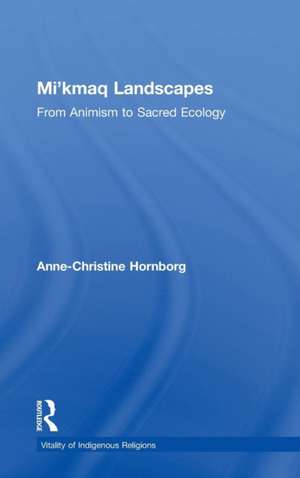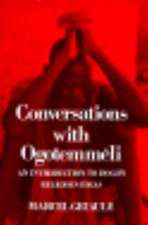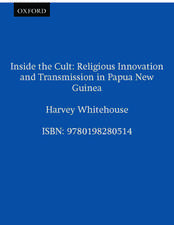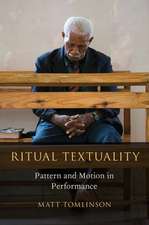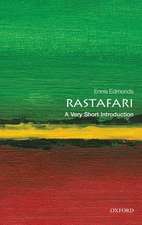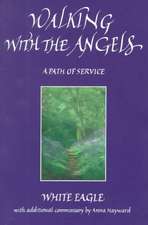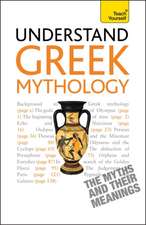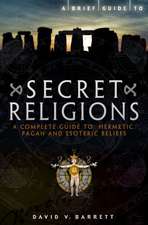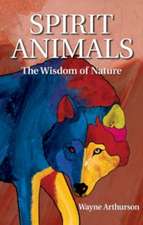Mi'kmaq Landscapes: From Animism to Sacred Ecology: Vitality of Indigenous Religions
Autor Anne-Christine Hornborgen Limba Engleză Hardback – 28 mai 2008
| Toate formatele și edițiile | Preț | Express |
|---|---|---|
| Paperback (1) | 383.50 lei 6-8 săpt. | |
| Taylor & Francis – 30 iun 2021 | 383.50 lei 6-8 săpt. | |
| Hardback (1) | 1054.71 lei 6-8 săpt. | |
| Taylor & Francis – 28 mai 2008 | 1054.71 lei 6-8 săpt. |
Din seria Vitality of Indigenous Religions
-
 Preț: 567.84 lei
Preț: 567.84 lei -
 Preț: 469.34 lei
Preț: 469.34 lei -
 Preț: 389.66 lei
Preț: 389.66 lei -
 Preț: 383.33 lei
Preț: 383.33 lei -
 Preț: 435.21 lei
Preț: 435.21 lei -
 Preț: 489.10 lei
Preț: 489.10 lei -
 Preț: 466.88 lei
Preț: 466.88 lei -
 Preț: 386.18 lei
Preț: 386.18 lei -
 Preț: 383.30 lei
Preț: 383.30 lei -
 Preț: 489.26 lei
Preț: 489.26 lei - 16%
 Preț: 338.33 lei
Preț: 338.33 lei -
 Preț: 380.78 lei
Preț: 380.78 lei -
 Preț: 416.22 lei
Preț: 416.22 lei - 18%
 Preț: 1109.18 lei
Preț: 1109.18 lei - 17%
 Preț: 257.25 lei
Preț: 257.25 lei -
 Preț: 379.86 lei
Preț: 379.86 lei -
 Preț: 489.26 lei
Preț: 489.26 lei -
 Preț: 394.19 lei
Preț: 394.19 lei -
 Preț: 489.26 lei
Preț: 489.26 lei - 17%
 Preț: 259.92 lei
Preț: 259.92 lei - 18%
 Preț: 1000.27 lei
Preț: 1000.27 lei -
 Preț: 449.41 lei
Preț: 449.41 lei - 18%
 Preț: 1000.27 lei
Preț: 1000.27 lei -
 Preț: 449.41 lei
Preț: 449.41 lei -
 Preț: 323.23 lei
Preț: 323.23 lei - 18%
 Preț: 1109.18 lei
Preț: 1109.18 lei -
 Preț: 469.34 lei
Preț: 469.34 lei
Preț: 1054.71 lei
Preț vechi: 1286.24 lei
-18% Nou
Puncte Express: 1582
Preț estimativ în valută:
201.82€ • 210.30$ • 167.11£
201.82€ • 210.30$ • 167.11£
Carte tipărită la comandă
Livrare economică 03-17 aprilie
Preluare comenzi: 021 569.72.76
Specificații
ISBN-13: 9780754663713
ISBN-10: 075466371X
Pagini: 214
Dimensiuni: 156 x 234 x 14 mm
Greutate: 0.45 kg
Ediția:1
Editura: Taylor & Francis
Colecția Routledge
Seria Vitality of Indigenous Religions
Locul publicării:Oxford, United Kingdom
ISBN-10: 075466371X
Pagini: 214
Dimensiuni: 156 x 234 x 14 mm
Greutate: 0.45 kg
Ediția:1
Editura: Taylor & Francis
Colecția Routledge
Seria Vitality of Indigenous Religions
Locul publicării:Oxford, United Kingdom
Notă biografică
Anne-Christine Hornborg is Professor in History of Religions in the Centre for Theology and Religious Studies at Lund University, Sweden. She has also previously lectured at the Centre for Theology and Religious Studies, Human Ecology Division and the Department of Social Anthropology, Lund University. She has undertaken fieldwork, conducted 1992-1993, 1996 and 2000 on the reservations of Cape Breton Island, Nova Scotia, and Canada, during 1998 and 2001 in Tonga, and during 2004 in Peru. Anne-Christine Hornborg has written several international, published articles concerning indigenous worldviews, rituals and embodiment, the phenomenology of landscape, the anthropologist in field, and ecology and religion. Currently she is developing the new interdisciplinary field "Ritual Studies". In this field of research, she will examine rituals as lived experience, new rituals in late modernity, ritual and practice theory, and the importance of cross-disciplinary studies in developing theories of ritual and of ritual practices.
Recenzii
'Anne-Christine Hornborg provides valuable insights into changing spiritual and land-based practices of Mi'kmaq in Canada (principally Nova Scotia's Cape Breton Island) since the seventeenth century, focusing on the twentieth century while also considering prospects and limitations for knowledge of pre-contact and early contact Mi'kmaq traditions.' Journal of the Royal Anthropological Institute
Descriere
This book seeks to explore historical changes in the lifeworld of the Mi'kmaq Indians of Eastern Canada. The Mi'kmaq culture hero Kluskap serves as a key persona in discussing issues such as traditions, changing conceptions of land, and human-environmental relations. This study discusses the eco-cosmology that has been formulated by modern reserve inhabitants and that could be labeled a 'sacred ecology'.
